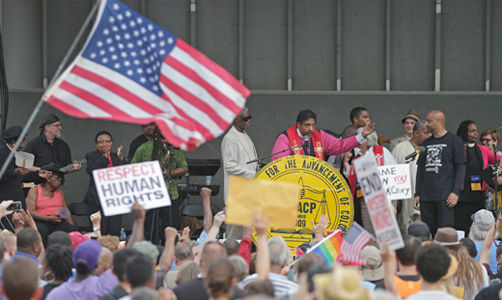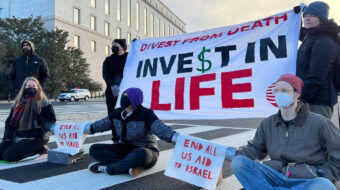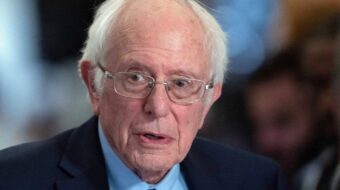
WINSTON-SALEM, N.C. – July 13 marked the first day of a federal trial challenging North Carolina’s voter suppression law, known as H.B. 589. The North Carolina State Conference of the NAACP, one of the lead plaintiffs in the case, appeared before U.S. District Judge Thomas D. Schroeder to present evidence that the state’s law violates Section 2 of the Voting Rights Act, as well as the 14th and 15th Amendments of the U.S. Constitution, by discriminating against of voters of color.
Rev. Dr. William J. Barber II, president of the North Carolina NAACP, was among witnesses to take the stand on the first day of trial. In highlighting the historical context of voter suppression in the state of North Carolina, the Rev. Dr. Barber said: “In North Carolina, a literacy test is still on the books. The Voting Rights Act overruled it, but it remains there as a symbol. When I think of all the martyrs of the civil rights movement – Viola Liuzzo, James Chaney, Michael Schwerner, Andrew Goodman, Rev. James Reeb, Medgar Evers and the scores and scores of people who died for the right to vote-this country should be doing everything humanly possible to ensure all people can vote.”
Over the course of the trial, the legal team representing the North Carolina NAACP – including national racial justice organization Advancement Project, the law firm of Kirkland & Ellis, LLP and attorneys Irving Joyner and Adam Stein – will show that lawmakers deliberately crafted H.B. 589 to chip away at the very measures African Americans and Latinos use most heavily. With prior knowledge of the discriminatory impact that H.B. 589 would have on African Americans and Latinos, the legislature proceeded with surgical precision to pass one of the most restrictive voter suppression laws in the nation.
Among other provisions, the law shortens the early voting period by a full week, eliminates same-day registration, prohibits provisional ballots cast out of precinct from being counted for even statewide or national races, expands the ability to challenge voters, and eliminates a pre-registration program for 16- and 17-year olds. Each of these measures were used at disproportionally higher rates by voters of color than White voters. The law also implemented a restrictive photo ID requirement, which will be addressed at a later date.
“The North Carolina NAACP and our other plaintiffs understand that this case is grounded in a pivotal moment in North Carolina and U.S. history,” said Advancement Project Co-Director Penda D. Hair. “For many African Americans in this courtroom and outside, the fight for equal voting rights is not ancient history; it is lived experience. The right to vote did not immediately become equal overnight in North Carolina after 1965. The struggle to gain the right to vote in this state has been an arduous, slow effort to overcome one barrier placed in the path of African Americans after another. While African Americans, in particular, but also Latinos, made impressive gains in registration and voting from 2002 to 2012, the ability to vote and elect candidates of choice has NEVER been fully equal for African American and Latino voters in North Carolina.”
Hair also countered the State’s claim that the changes mandated by H.B. 589 are “neutral on their face,” pointing out that Section 2 of the Voting Rights Act prohibits practices that disproportionately burden voters of color.
“Poll taxes were neutral on their face,” said Hair. “Literacy tests were neutral on their face. The law teaches it is the impact that matters – an impact that is linked to social and historical conditions – not whether a law explicitly says African Americans or Latinos are not allowed to vote.”
The outcome of the trial will have sweeping implications for voting rights nationwide. Since the Supreme Court’s 2013 Shelby County v. Holder decision, which gutted the pre-clearance coverage formula of the Voting Rights Act, dozens of states have introduced and passed restrictive voting policies. North Carolina’s H.B. 589 is unique in that it is the nation’s worst voter suppression law, comprehensively targeting nearly every aspect of the voting process – who can vote, where they can vote, when they can vote, and how they can vote.
Outside the courtroom, the North Carolina NAACP and Forward Together Moral Movement hosted a day-long series of teach-ins on various justice issues, and capped the day with a mass rally and march as North Carolinians refused to surrender to attacks on their right to vote. Under the refrain of “This is Our Selma,” thousands of people from across the state gathered for the march, which passed by the courthouse and concluded in downtown Winston-Salem. Trial will recommence tomorrow morning at 9:30 a.m.
Photo: Rev. William Barber speaks to a crowd at a rally in Winston-Salem, N.C., July 13, after the beginning of a federal voting rights trial. (AP Photo/Chuck Burton)











Comments